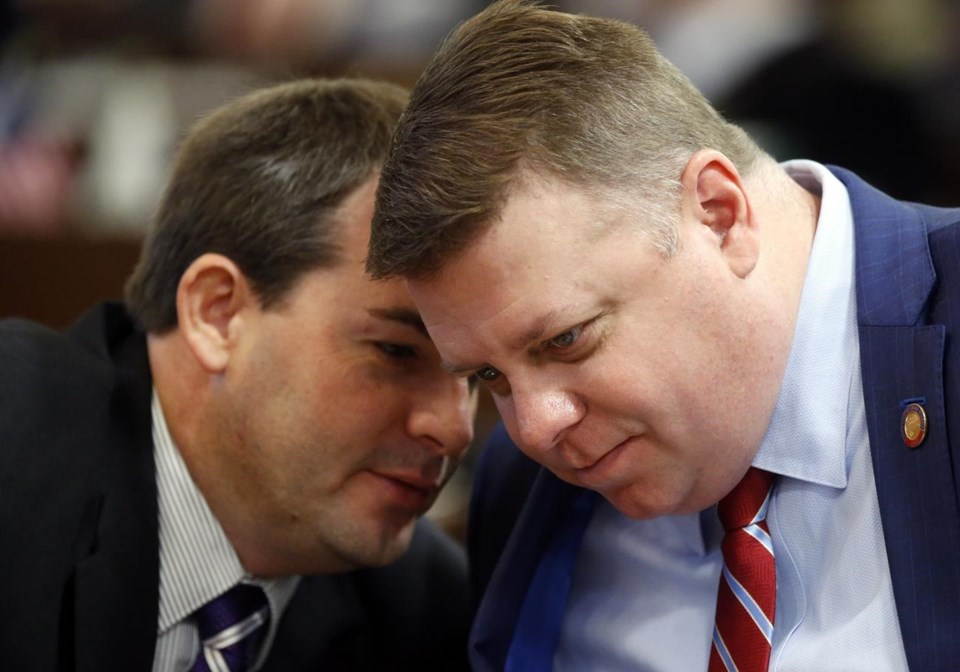RALEIGH, N.C. (AP) — With abortion restrictions, looser gun rules and deeper tax reductions likely in the balance, North Carolina Republican lawmakers and Democratic Gov. Roy Cooper are fighting in campaign trenches over whose policy agenda will win out in Cooper's final two years in office.
Democrats and their allies led by Cooper are bidding to prevent Republicans next month from holding veto-proof majorities for the first time since late 2018. Cooper was often powerless then to block laws except through litigation.
As in other divided-government states following the Supreme Court decision overturning Roe v. Wade, abortion looms large in several key General Assembly races. With enough Democratic legislators behind the governor, Cooper’s vetoes foiled limited abortion changes approved by the GOP-controlled legislature in 2019 and 2021.
Republican leaders are prepared to consider additional abortion restrictions next year but say there’s no consensus yet on details. That uncertainty and the slight electoral adjustment Republicans need — three more House seats and two in the Senate to regain veto-proof majorities — feed into Democratic campaign narratives.
“In North Carolina, women still have reproductive freedom,” Cooper said at a recent event with Democratic female legislative candidates. “And as governor, I aim to keep it that way. But I cannot do it alone — I have to have a number in the legislature who would be willing to stand with me.”
Republican leaders, who have played down the abortion issue during fall campaigning, are optimistic about reaching those thresholds.
They say voters are focused on the national economy and 40-year inflation highs under Joe Biden’s presidency. GOP candidates are running ads blaming Washington for higher prices and talk about what Republicans in Raleigh have done to counter them, such as cutting income taxes.
“This becomes a national election just as much as a state House or state Senate election,” said Rep. Jason Saine of Lincoln County, a House Republican Caucus leader, and GOP legislative candidates “end up being the beneficiary of that.”
Political consultants and legislators from both parties expect the outcomes of roughly 15 key races to be the difference makers out of the entire 170 General Assembly election slate. Cooper is term-limited from seeking reelection in 2024.
“All of us are fighting out here,” said Rep. Linda Cooper-Suggs, a Wilson County Democrat facing a tough challenge from Republican Ken Fontenot.
In 2017 and 2018, Republicans with veto-proof majorities overrode 23 of Cooper’s 28 vetoes. None of the governor’s 47 vetoes have been overridden since.
Democrats credit Cooper’s veto stamp with bringing Republicans to the table to negotiate, contributing to recent successes in economic development and clean energy.
“It is critical that some balance remain in each chamber for that to happen,” said House Minority Leader Robert Reives of Chatham County.
Cooper said the GOP’s “worst impulses can’t be stopped” if it gains too much power. But Senate leader Phil Berger said a supermajority actually protects the state from Cooper’s bad decisions. Berger named vetoed bills that would have raised teacher pay and ensured that July 4 fireworks displays and parades could happen in 2020 during the pandemic.
Berger said the GOP agenda under a veto-proof majority wouldn’t be much different from the past four years.
“We’re going to continue to push to reduce our tax rates. We’re going to continue to push to address regulatory problems,” Berger said. “We’re going to continue to push to address the abysmal situation in our education system, where our children are not learning how to read.”
Other approved legislation Cooper successfully vetoed could make comeback appearances — like bills demanding county sheriffs assist federal immigration agents who want to detain jail inmates, eliminating pistol purchase permits, and moving up dates when completed mail-in absentee ballots must be received.
North Carolina law prohibits abortions after 20 weeks of pregnancy, with exceptions for a pregnant woman’s medical emergency. That makes North Carolina a location for women from more restrictive states nearby seeking the procedure.
The Supreme Court ruling contributed to a surge in abortion-rights political activity. Planned Parenthood's political arm is campaigning in 14 legislative races under a $5 million spend in North Carolina elections.
In the swing 18th Senate District, which includes part of Wake County and all of Granville County, Democratic attorney Mary Wills Bode and Republican real estate investor E.C. Sykes are running for an open seat.
At the news conference last month with Cooper, Bode accused Sykes of wanting “to ban reproductive health care in our state in every situation, under every circumstance, no exceptions.”
Sykes said in an interview he believes in exceptions for rape and incest, but thinks North Carolina’s abortion law shouldn’t “be more liberal than our neighboring states are.”
Sykes added that “the issues and the concerns that I'm hearing about are the economy and jobs, what's happening to their income.”
Cooper-Suggs and Fontenot said abortion isn't the predominant issue in their rural 24th House District race — people there are more conservative, and the influence of churches remains strong.
Cooper-Suggs has received endorsements from abortion rights groups. Fontenot, a church pastor opposed to abortion, narrowly lost to Cooper-Suggs’ Democratic predecessor in 2018 as an unaffiliated candidate.
Fontenot said changes to welfare programs he seeks would encourage families to remain intact and discourage abortions. He said he wants to get elected “to update a lot of the policies that we have in place that I believe can help our everyday citizens.”
Gary D. Robertson, The Associated Press



